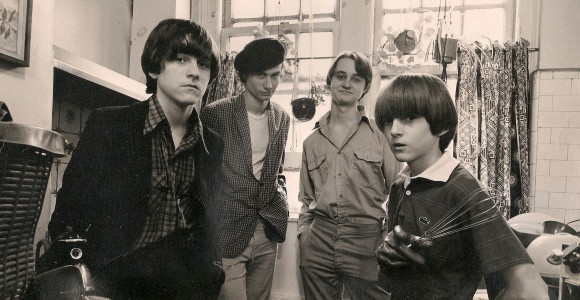Filmmaker Lucy Kostelanetz premiered her first documentary feature Sonia in 2007 in film festivals around the world. Her previous work included two award-winning films for children, Rebeka Goes Down the Slide and Rebeka Goes to China. Lucy also worked at the New York State Council on the Arts during its early creative, idealistic period (1968–1981) and has served twice on the Board of International Film Seminars. [Press materials]
We Don’t Wanna Make You Dance will play at DOC NYC on November 17.
Women and Hollywood: Please give us your description of the film playing.
Lucy Kostelanetz: In 1983 I filmed the band, Miller Miller Miller & Sloan, when they were still in their teens and very hopeful that they would “make it”. They had a large and enthusiastic local following in New York City, including many of their Music and Art High School classmates. The film captures that moment in time with scenes from rehearsals, home interviews, and best of all, performance and backstage footage at CBGB.
In 1988 I went back to see what had happened to them. They were still performing and trying to stay together. But the realities of life and earning a living were starting to erode the dream. And, even more discouraging, the “record deal” that was required of bands at that time for any hope of success continued to elude them. By 1993 the band broke up.
In 2007 I reconnected with all the former band members, curious to see how that “dream” and the enormous amount of time and work they had put into trying to make it happen might have played out in their eventual lives. Only one of the former band members has continued to pursue the dream, although now with the Internet, the challenges and possibilities are totally different. The others have incorporated the experience into their careers in surprising and interesting ways.
This is not a classic Behind the Music story by any means. Rather, it is one that speaks to the resiliency and resourcefulness that people can acquire in pursuing creative goals.
WaH: What drew you to this story?
LK: Initially I was interested in the band’s dream of “making it,” which seemed so powerful at that time and really still persists today. But since I had the rare opportunity to follow them through time, the meaning of the film took on many more dimensions. And ultimately what most interested me was where the creativity of that time as a band led them eventually in their lives.
WaH: What was the biggest challenge in making the film?
LK: The biggest challenge for me was reconnecting with my subjects after a hiatus of twenty years and re-engaging them in the film. Some were puzzled about why I found them so interesting. Nevertheless, they were all wonderfully giving with me on camera, for which I was extremely grateful and appreciative.
WaH: What advice do you have for other female directors?
LK: I would recommend to all female directors to follow their own style and sensibility. They should not feel beholden to pre-established documentary conventions in order to be taken seriously.
WaH: What’s the biggest misconception about you and your work?
LK: I like telling a story from the ground up and leaving space for the viewer to engage and make their own connections and discoveries. Perhaps, for viewers who are used to a tight linear, classically dramatic structure, this approach might seem too diffuse and laid back.
WaH: Do you have any thoughts on what are the biggest challenges and/or opportunities for the future with the changing distribution mechanisms for films?
LK: Ironically, one of the sub-themes of my film is the changing delivery system for music from the requisite record deal to the possibilities of the Internet. For filmmakers these days the changing distribution possibilities have the same pros and cons. Filmmakers supposedly have the technological means to take control over their own distribution. But the problem of breaking through the “noise” still persists. How to find an audience and market are still the same challenges.
WaH: Name your favorite women directed film and why.
LK: Cleo from 5 to 7 by Agnes Varda. The film, made in 1962, seemed to me at that time a totally singular departure from anything I had ever seen and had very much a woman’s sensibility. I loved the unhurried pacing of the film and that it’s a story told with quiet implicitness.
Watch the trailer for We Don’t Wanna Make You Dance:







